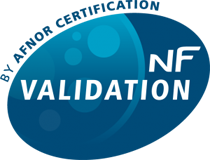What is an alternative analysis method ?
An alternative analysis method is a commercial method which can be used, for a given category of products or a given type of water, to analyse or estimate the same analyte(s) as the one(s) measured by a standardized method but which also meets one or more of the following criteria:
- Speed of analysis and/or response,
- Ease of use and/or automation,
- Satisfactory analytical characteristics (limit of detection, specificity…).
The term “alternative method” refers to the product, equipment and operating mode. It includes all the ingredients, material or not, which are required to implement the alternative method. In the water analysis application, for detection/quantification of Legionella based on a PCR method, we generally use the term “kit”, the effectiveness of which can be evaluated according to a standardized protocol.
Who is involved in NF VALIDATION certification ?
- A Validation Commission which manages the activity (certification rules, development, promotion, appeals…)
- Technical Boards consisting of experts in microbiology who examine the application files and evaluate the results of the validation studies
- Expert laboratories, approved to perform validation studies according to current technical protocols
- Auditors approved to perform audits on the production site of the methods, according to the current requirements
What is the difference between Validation and Certification ?
The words “method validation” are very commonly used, sometimes in very diverse contexts. We talk about inter- or intra-laboratory validation or third-party validation. We talk about reference method, quick method or internal method validation…
For the NF VALIDATION mark specifically, certification covers the general process used (based on very strict rules which govern the procedure of obtaining the mark) and validation refers to the technical aspect of the procedure.
For each method concerned, a validation study (in several phases) is carried out, according to an approved technical protocol, to assess the effectiveness of the method to be validated. At the same time, the production site of the method is audited in order to guarantee the long-term reliability of the quality system. Then, once technical validation has been granted, monitoring and renewal conditions are defined within the context of the certification procedure.
Thus, it is possible for an isolated laboratory to “validate” the effectiveness of a kit on the basis of a technical evaluation protocol. However, this validation will not result in the issue of a certificate of conformity since there are no certification rules governing the implementation conditions of these tests, the decision procedure or the monitoring conditions of the method.
When an NF VALIDATION mark certification is issued, the validation study has been carried out by an approved laboratory, in accordance with predefined rules established by AFNOR Certification. These rules state in particular that the results must be examined by a group of independent experts followed by the issue of a certificate that is legally binding on AFNOR Certification as well as the right to use the NF VALIDATION mark.
